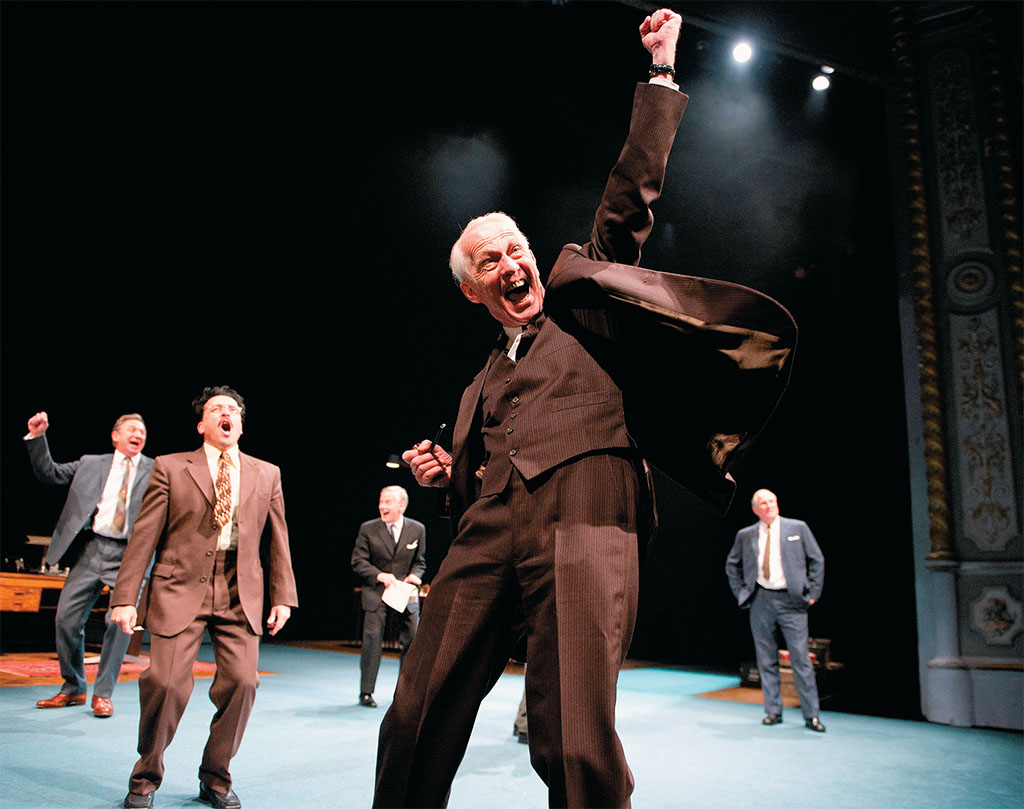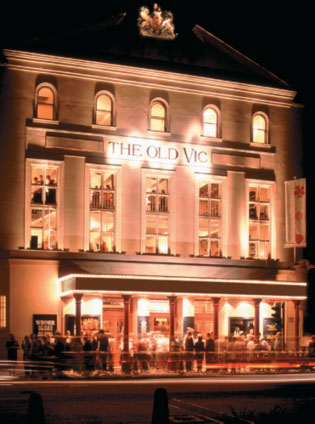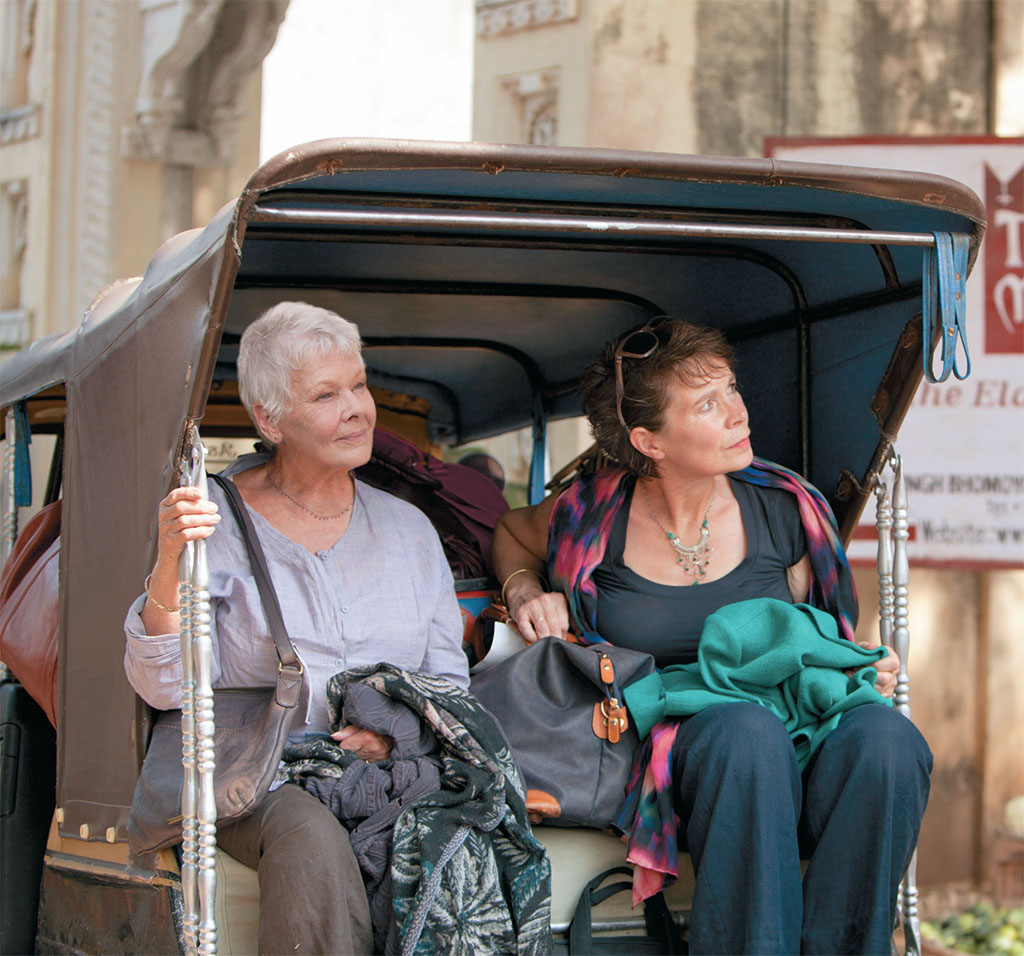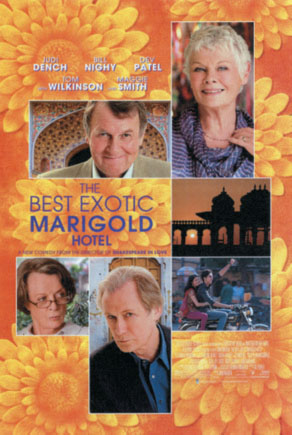
[caption id="CheersForTheOldVic_img1" align="aligncenter" width="1024"]

TRISTRAM KENTON
[caption id="CheersForTheOldVic_img2" align="alignright" width="315"]

THEATRE
The Old Vic
The Cut London SE1 8NB
WITH ITS FAMILIAR tall gray façade adorned with narrow Roman columns, The Old Vic is not just a world famous theater, but a vital part of the South London neighborhood where it has stood alone on a corner of The Cut for almost 200 years. This theater has a rich history; the greatest stage actors of their time have performed on its stage. Memories of my first visits are deeply etched going back almost four decades. What a thrill it was to see Laurence Olivier on the Old Vic stage in 1973 in The Party in what was to be his last stage performance. And I remember the afternoon in 1974 when I had a cheap standing room ticket for John Gielgud’s magical portrayal of Prospero in Peter Hall’s production of The Tempest. Anyone who has visited London and has even the smallest interest in theater will have their own memories of the Old Vic.
The building opened in 1818 as the Royal Coburg Theatre. In 1833 it was renovated and renamed the Royal Victoria Hall, which eventually was shortened to the Old Vic. At the beginning, the Old Vic put on operas, musical revues and some plays. Under the management of Emma Cons in the late 19th century, however, and continued by her niece Lilian Baylis starting in 1912, the play list moved solely to theater. The Old Vic Shakespeare Company was established, and the theater became known as a permanent site for Shakespeare’s plays.
Cons believed that the Old Vic should serve the blue-collar working-class neighborhood where it was located. She gave the newly formed Morley Memorial College for Working Men and Women a home in the theater in 1884. With her passion to provide theater for working-class people, she believed that the college and the Old Vic were a good fit. Specializing in adult education courses at a reasonable tuition, the college remained at the Old Vic until 1923, when it relocated to its current location on nearby Westminster Bridge Road. In 1963 Laurence Olivier led the newly formed National Theatre into the Old Vic for a period of 13 years, while its new home, a complex with three theaters, was being built overlooking the Thames a short distance away.
The Old Vic is a fixture on The Cut, a charming tree-lined street that is also home to the Young Vic Theatre farther down the road. The Cut is lined with restaurants and pubs for a pre-theater meal or a post-performance drink. The Anchor & Hope at 36 The Cut offers a British menu, while Livebait at 43 The Cut provides fresh seafood cooked to perfection.
Over the years the Old Vic has reinvented itself again and again to ensure that its doors remain open. It receives no government funds and functions under the Old Vic Theatre Trust—a charity set up to ensure its future and to safeguard its history. In 2003 the American actor Kevin Spacey was named the artistic director, and like Olivier before him he manages the theater as well as acts in some of its productions. In continuing with the commitment to its neighborhood, the Old Vic offers subsidized tickets and frequent workshops for the public. Spacey has said that he will depart the Old Vic in 2015. The show must go on, however, and it will go on as the sparkling lights from the Old Vic continue to illuminate that corner of The Cut and draw audiences to fill its 1,000 red, velvet seats for outstanding theater. Long live the Old Vic.
For information about current productions go to www.oldvictheatre.com.
—Jennifer Dorn
[caption id="CheersForTheOldVic_img3" align="aligncenter" width="1024"]

COURTESY OF FOX SEARCHLIGHT PICTURES
MOVIES
The Best Exotic Marigold Hotel
[caption id="CheersForTheOldVic_img4" align="alignright" width="292"]

“OH, YOU WANT A DOOR ON YOUR BEDROOM?”
This is a film for grownups—no, for real grownups. Even your adult children, if they’re below 40, won’t fully appreciate this movie. It’s hard to imagine anyone not enjoying the Marigold Hotel, but to get the nuances and fully understand the characters here, you’ve just got to have been around the block a few times.
Seven English retirees journey to Jaipur, India, in anticipation of their golden years, lured by the colorful, promising brochures of the Best Exotic Marigold Hotel for the Elderly and Beautiful. Alas, as they discover immediately, the brochure was more than a tad optimistic in its promotion.
Coping with the unexpected, the unfamiliar and the downright odd, of course, is a British specialty, and none of these are folks who have any intention of going gently into that good night. Judi Dench and Maggie Smith headline a wonderful and familiar cast of British character actors—Tom Wilkinson, Bill Nighy, Penelope Wilton, Ronald Pickup and Celia Imrie. Here they are, plunked down like the castaways of Gilligan’s Island in the dusty, crowded, colorful streets of urban India.
Sonny Kapoor (Dev Patel), the young, perennially optimistic Indian hotelier, has far more enthusiasm than business acumen. The failings, missteps and general dilapidation of the old Indian palace makes Fawlty Towers look like the Ritz. But Sonny is undeterred: “We have prepared for you a special English roast! Goat curry!”
His outlook is sunny indeed: “Everything will be all right in the end; if it is not all right, then it is not yet the end.” In fact, that’s the movie’s principal motif, worked out in its own way for each of the castaways. Each has to come to grips with the India they have landed in, and with the reasons that brought them there. And each in their own way is the aging quester of Alfred Lord Tennyson’s poem “Ulysses,” discovering that it is never too late to seek their own Brave New World.
Superbly colorful, evocative cinematography, richly humorous and ultimately heart-warming: this is one of those rare movies that will stick with you. The movie didn’t play long in first run theaters, despite the enthusiastic reception it received. Catch the Marigold Hotel on DVD or electronic media. You’ll want to add it to your library, in any event. They don’t often make them like this.





Comments